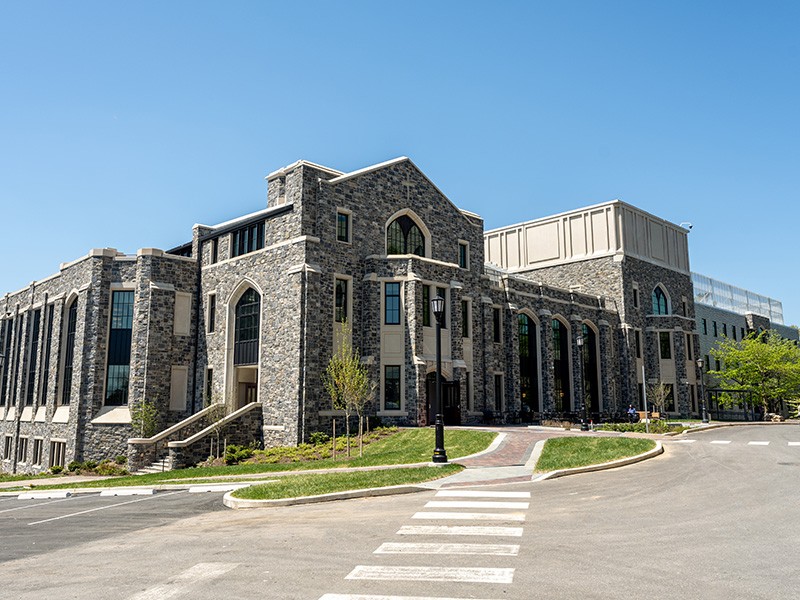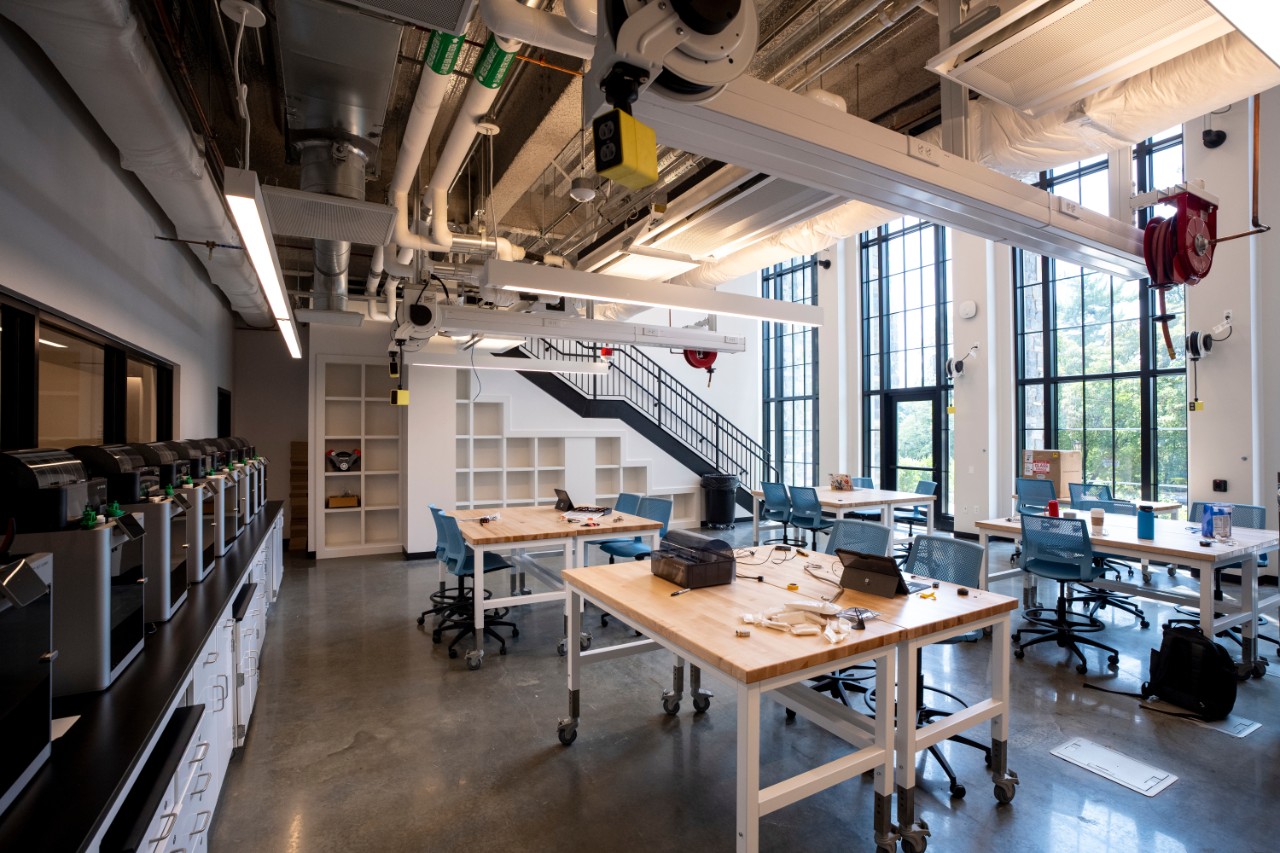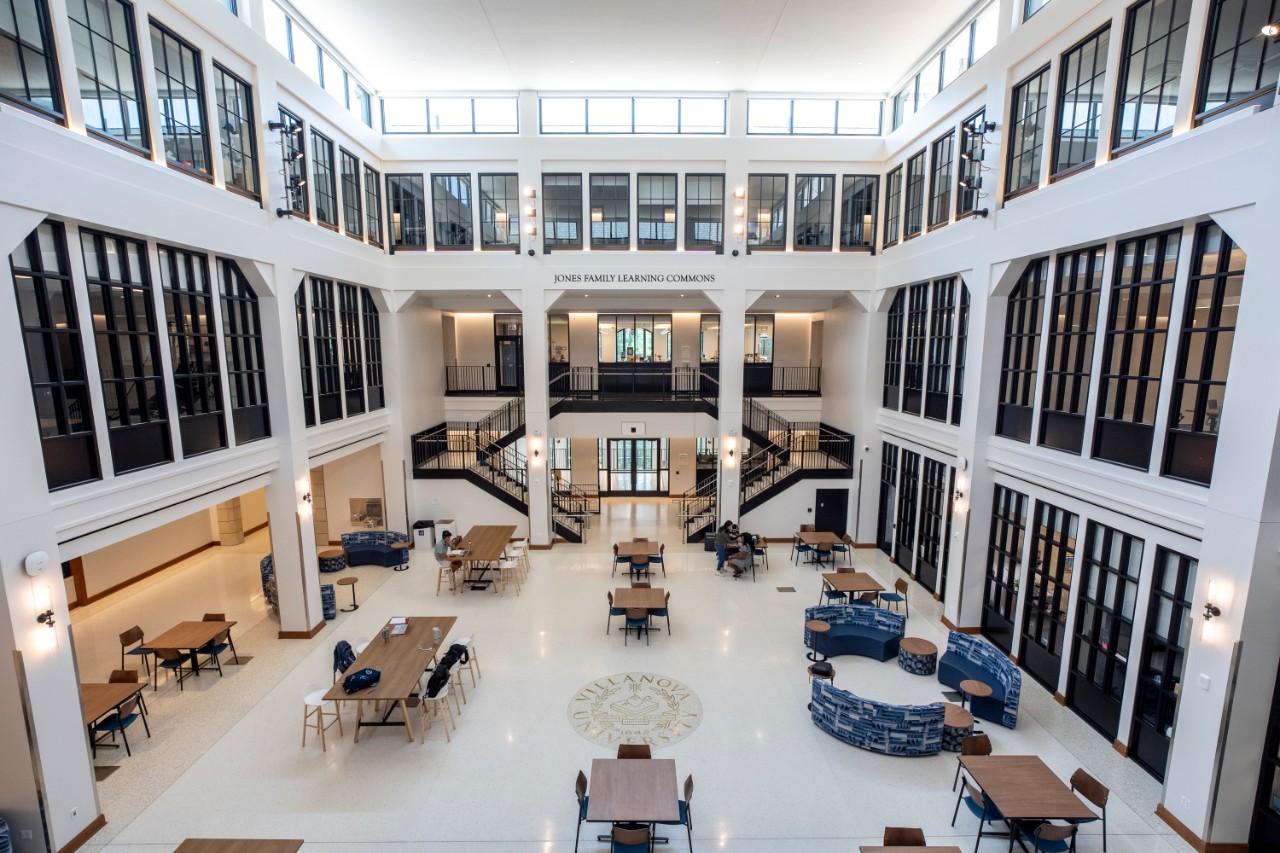Villanova University Opens Drosdick Hall, New Home of the College of Engineering

VILLANOVA, Pa. (August 26, 2024) – As the 2024-25 academic year begins, Villanova University officially opens Drosdick Hall—the new home of the College of Engineering—following the completion of a $125 million, 150,000-square-foot, state-of-the-art building expansion. This ambitious project more than doubled the size of the College of Engineering’s primary academic building, allowing for enhancements to all aspects of the academic and student experience. This ushers in a new era in engineering education at the University and further underscores the University’s commitment to interdisciplinary research and innovation as part of its Strategic Plan.
"The opening of Drosdick Hall is a transformative moment for Villanova’s College of Engineering," said University President the Rev. Peter M. Donohue, OSA, PhD. "This building creates an exceptional environment for the next generation of Villanova engineers and further exemplifies Villanova’s dedication to advancing the priorities of our Strategic Plan."
Drosdick Hall unites all of the College of Engineering’s departments in one location, serving as a catalyst for cross-disciplinary discovery and innovation. Every aspect of the expansion—from the placement of faculty offices and lab configurations to meeting spaces—was designed to foster connections and facilitate collaboration.
"Drosdick Hall was designed to create a crossroads of innovation," said Michele Marcolongo, PhD, PE, Drosdick Endowed Dean of the College of Engineering. "This new building will empower our students and faculty to push boundaries and make groundbreaking contributions to benefit society, furthering our commitment to engineering for the greater good."
The building includes improved and expanded research facilities, as well as state-of-the-art instruction spaces for hands-on, problem-oriented and team-based learning. In addition to serving as a learning and innovation hub for Villanova engineers, the expanded building benefits the entire Villanova community with common spaces open to all.

Highlighted features of Drosdick Hall include:
- More than 20 new laboratory spaces designed for multidisciplinary teams to work together on topical areas of research.
- The two-story Drosdick Innovation Lab, which includes workspaces, tools and equipment for building, and space to accommodate large-scale project work.
- The Jones Family Student Learning Commons, a community space at the heart of the building for all Villanovans to gather, study and learn.
- Green roofs—instrumented with smart systems to collect and monitor climate and soil moisture data—which will serve as cutting-edge teaching and research resources.
- Contemporary instruction spaces that can adapt to small discussion and larger lecture formats.
- Dedicated, centrally located office spaces and lounges for the College of Engineering’s master’s and doctoral students.

“The expansion and renovation of Drosdick Hall provides Villanova Engineering with a first-rate research and teaching facility that is reflective of the College’s national stature,” remarked Patrick G. Maggitti, PhD, University Provost. “It will inspire and support the academic pursuits of our outstanding faculty and students, now and well into the future.”
Drosdick Hall is named after John G. Drosdick ’65, a chemical engineering alumnus and retired chairman and chief executive officer of Sunoco, Inc., in recognition of his $20 million in support of the expansion project since its inception. A former chair of Villanova’s Board of Trustees, Mr. Drosdick’s philanthropic commitment to the College of Engineering also includes investment in the Drosdick Innovation Lab and two endowments—the Drosdick Endowed Dean of the College of Engineering and the John G. Drosdick Endowed University Scholarship, which supports Engineering students with demonstrated financial need.
Groundbreaking for the expansion project took place in Spring 2022. Developed through a collaborative process with input from engineering faculty and students, the project was brought to life by architectural firms BLTa–A Perkins Eastman Studio and Robert A.M. Stern Architects, LLP. Construction was completed by Wohlson Construction Company, who excavated 25,000-cubic-yards of earth and utilized 971 tons of steel to complete the expansion. The building was designed in the Collegiate Gothic Revival style, inspired by the science and engineering buildings developed by noted Philadelphia architect Charles Klauder, who was active in the early 20th century.
About Villanova University College of Engineering: Founded in 1905, Villanova University College of Engineering is committed to an educational program that emphasizes technical excellence and a liberal arts education within the framework of the University’s Augustinian Catholic tradition. The result is rigorously educated, socially grounded, conscientious thinkers and doers who are professionally prepared to make meaningful change in the world.
About Villanova University: Since 1842, Villanova University’s Augustinian Catholic intellectual tradition has been the cornerstone of an academic community in which students learn to think critically, act compassionately and succeed while serving others. There are more than 10,000 undergraduate, graduate and law students in the University's six colleges—the College of Liberal Arts and Sciences, the Villanova School of Business, the College of Engineering, the M. Louise Fitzpatrick College of Nursing, the College of Professional Studies and the Villanova University Charles Widger School of Law. Ranked among the nation’s top universities, Villanova supports its students’ intellectual growth and prepares them to become ethical leaders who create positive change everywhere life takes them. For more, visit www.villanova.edu.
